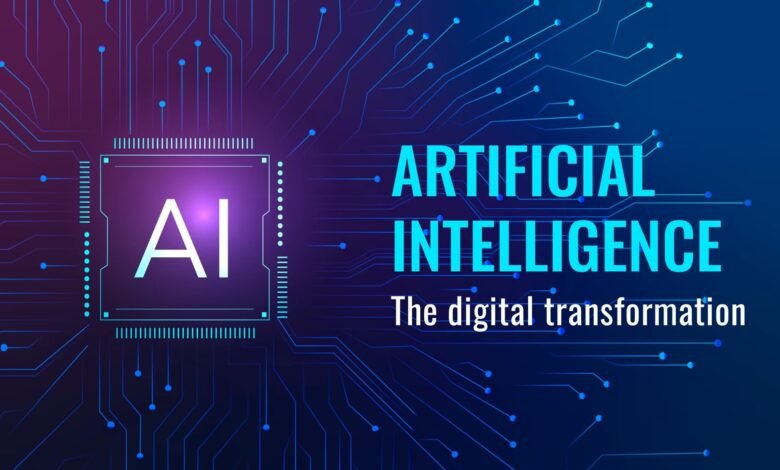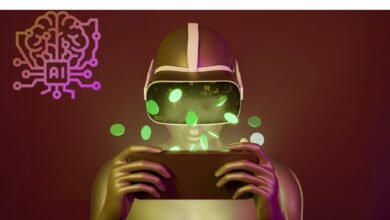Demystifying Artificial Intelligence: A Comprehensive Guide for Beginners

Artificial Intelligence (AI) is a field that has captured the imagination of many. AI is making waves in various industries, from science fiction to real-world applications. In this comprehensive guide for beginners, we will demystify AI, breaking down complex concepts into easy-to-understand terms. By the end of this article, you’ll have a solid grasp of what AI is, how it works, and its impact on our lives.
What Is Artificial Intelligence?
Defining Artificial Intelligence
Artificial Intelligence, commonly known as AI, is the simulation of human intelligence in machines programmed to think and learn like humans. These machines can perform tasks that typically require human intelligence, such as problem-solving, pattern recognition, and decision-making.
Read More: The Impact of Artificial Intelligence on SEO 2023
History of Artificial Intelligence
AI is not a recent development. Its roots can be traced back to ancient history, where the idea of creating intelligent beings, such as automatons, was explored. However, modern AI as we know it began to take shape in the mid-20th century.
Types of Artificial Intelligence
There are two main types of AI:
- Narrow AI (Weak AI): This type of AI is designed for specific tasks. It excels in performing predefined functions but needs to gain the ability to generalize beyond those tasks.
- General AI (Strong AI): General AI possesses human-like intelligence and can perform various tasks, learn from experience, and adapt to new situations. However, we have yet to achieve this level of AI.
Now that we’ve defined AI let’s explore how it works.
How Does Artificial Intelligence Work?
Machine Learning
Machine learning is a subset of AI that focuses on developing algorithms that enable computers to learn from and make predictions or decisions based on data. It involves training models on large datasets to recognize patterns and make accurate predictions.
Deep Learning
Deep Learning is a subfield of machine learning that uses neural networks with multiple layers to process and analyze data. This approach has been particularly successful in tasks like image and speech recognition.
Neural Networks
Neural networks are a fundamental concept in AI and are inspired by the structure of the human brain. These interconnected nodes process information and are used in various AI applications.
Now that we understand how AI works let’s explore its presence daily.
AI in Everyday Life
Virtual Assistants
Virtual assistants like Siri, Alexa, and Google Assistant are common AI applications that use natural language processing to understand and respond to user queries.
Social Media Algorithms
Social media platforms employ AI algorithms to personalize users’ feeds, showing them content that aligns with their interests and preferences.
Recommendation Systems
Online shopping platforms and streaming services use AI-powered recommendation systems to suggest products and content to users.
As we experience AI in our daily lives, it’s essential to consider its ethical implications.
The Ethical Implications of Artificial Intelligence
Bias in AI
AI algorithms can inherit biases in the data they are trained on, leading to discriminatory outcomes. Addressing bias in AI is a crucial ethical concern.
Privacy Concerns
AI technologies, especially in surveillance and data analysis, raise significant privacy issues that must be carefully managed.
Job Displacement
The automation of tasks by AI can potentially displace jobs, which requires us to rethink our workforce and job market.
Artificial Intelligence in Healthcare
Diagnosis and Treatment
AI can assist healthcare professionals in diagnosing diseases and recommending treatment plans by analyzing medical data.
Drug Discovery
AI accelerates drug discovery by identifying potential compounds and predicting their effectiveness.
Predictive Analytics
Predictive analytics powered by AI can forecast disease outbreaks and healthcare trends.
Artificial Intelligence in Business
Automation
AI-driven automation streamlines business operations by performing repetitive tasks, allowing employees to focus on more complex and creative work.
Customer Service
Chatbots and AI-driven customer support enhance user experiences and provide round-the-clock assistance.
Market Analysis
AI-powered data analysis gives businesses valuable insights into market trends and consumer behavior.
Artificial Intelligence in Entertainment
Content Generation
AI can generate written content, music, and even art, expanding creative possibilities.
Gaming
AI algorithms enhance gaming experiences through realistic simulations and intelligent opponents.
Film and Music
AI is used in film production for visual effects and music composition to create unique soundtracks.
Preparing for a Career in Artificial Intelligence
Educational Pathways
Various educational programs and online courses offer training in AI and related fields.
Skills Required
Skills such as programming, data analysis, and machine learning are essential for a career in AI.
Job Opportunities
AI professionals are in high demand across industries, with opportunities in research, development, and implementation.
Future in Artificial Intelligence
Artificial Intelligence (AI) has significantly advanced in recent years, revolutionizing various industries and changing how we live and work. As we look ahead, it’s essential to understand the future trends in AI and how they will continue to shape our world. In this article, we will explore some of the key trends and developments expected to define AI’s future.
- Explainable AI (XAI): One of the critical challenges in AI is the need for more transparency in how AI systems make decisions. Explainable AI aims to address this issue by making AI models more interpretable and understandable. In the future, AI systems must explain their decisions clearly, especially in healthcare and finance, where accountability is crucial.
- AI in Healthcare: AI has made significant inroads into the healthcare industry, from diagnostic tools to drug discovery. In the future, AI is expected to play an even more significant role, assisting doctors in making better decisions, predicting disease outbreaks, and personalizing patient treatment plans.
- AI in Education: Education is another domain where AI is expected to profound impact. Personalized learning experiences, intelligent tutoring systems, and automated grading are examples of how AI can transform education. In the future, AI will play a crucial role in addressing individual learning needs and making education more accessible.
- AI in Autonomous Vehicles: Thanks to AI, self-driving cars and autonomous vehicles are becoming a reality. In the future, we expect to see more advanced autonomous systems that are safer and capable of handling complex driving scenarios. This will revolutionize transportation and impact industries like logistics and delivery services.
- AI and Natural Language Processing (NLP): NLP technology has come a long way in understanding and generating human language. In the future, we can anticipate more advanced chatbots, virtual assistants, and language translation tools that can facilitate communication across different languages and cultures.
- AI Ethics and Regulation: As AI becomes more integrated into society, ethical considerations and regulations will become increasingly important. There will be a growing emphasis on responsible AI development, addressing bias in AI algorithms, and ensuring transparency in AI systems.
- Quantum AI: Quantum computing promises to solve complex problems much faster than classical computers. Quantum AI combines the power of quantum computing with AI algorithms, opening up new possibilities in fields like cryptography, materials science, and optimization.
- AI in Climate Change and Sustainability: AI can significantly address climate change and sustainability challenges. From optimizing energy consumption to monitoring environmental changes, AI-powered solutions will create a more sustainable future.
- AI in Creative Industries: AI is already used in creative fields like art, music, and design. In the future, AI will continue to assist artists and creators in generating new ideas, automating repetitive tasks, and pushing the boundaries of creativity.
- AI and Cybersecurity: With the increasing complexity of cyber threats, AI will be instrumental in enhancing cybersecurity measures. AI systems will be better equipped to detect and respond to cyberattacks in real time, providing enhanced protection for businesses and individuals.
- AI and Finance: In the financial sector, AI will continue to be used for fraud detection, algorithmic trading, and risk assessment. Additionally, AI-powered financial advisors will become more common, providing personalized financial guidance to individuals.
- AI in Space Exploration: AI will play a crucial role in space exploration, assisting in autonomous spacecraft navigation, data analysis from distant planets, and even the search for extraterrestrial life.
Read More: Top 10 Fighting AI Games to Play on AR in 2023
Conclusion
The future of AI is incredibly promising, with the potential to reshape nearly every aspect of our lives. AI will continue to drive innovation and efficiency from healthcare to education, transportation to creative industries. However, with these opportunities come challenges, including ethical considerations and the need for robust regulations. As we move forward, it’s essential to strike a balance between harnessing the power of AI and ensuring that it benefits society as a whole. The future of AI is bright, but its responsible development and deployment will be key to unlocking its full potential.
FAQS
What is Artificial Intelligence (AI)?
Artificial Intelligence is the simulation of human intelligence in machines programmed to think and learn like humans. It encompasses various techniques and technologies that enable computers to perform tasks that typically require human intelligence, such as problem-solving, speech recognition, and decision-making.
How does AI work?
AI systems process large amounts of data and use algorithms to identify patterns, make predictions, or solve specific tasks. Machine learning, a subset of AI, allows systems to improve performance over time through experience and data analysis.
What are some practical applications of AI?
AI is used in numerous applications, including natural language processing (NLP), image and speech recognition, autonomous vehicles, healthcare diagnosis, recommendation systems, and robotics. It has a wide range of uses across various industries.
What is the difference between AI, Machine Learning, and Deep Learning?
AI is the overarching field that encompasses all efforts to create intelligent machines. Machine Learning (ML) is a subset of AI focusing on developing algorithms enabling computers to learn from data. Deep Learning is a specific type of ML that uses neural networks with multiple layers to process and understand complex data.
Are there different types of AI?
Yes, there are two main types of AI: Narrow (or Weak) AI and General (or Strong) AI. Narrow AI is designed for specific tasks and is prevalent in today’s applications. General AI, on the other hand, would possess human-like intelligence and the ability to perform any intellectual task—a concept that remains largely theoretical at present.
Is AI replacing human jobs?
AI has the potential to automate certain tasks, but it also creates new opportunities for humans. While some jobs may be affected, AI is often used to enhance human capabilities and productivity rather than replace humans entirely. New roles and career paths in AI-related fields are emerging as well.
What are the ethical concerns surrounding AI?
Ethical concerns in AI include bias in algorithms, data privacy, job displacement, and the potential for AI to be used for malicious purposes. Ethical AI development focuses on ensuring fairness, transparency, and accountability in AI systems.
How can beginners get started with AI?
Beginners interested in AI can start by learning programming languages like Python and exploring online courses and tutorials on AI and machine learning. Joining AI communities, reading books, and working on small projects can also help build a foundation in AI.











3 Comments